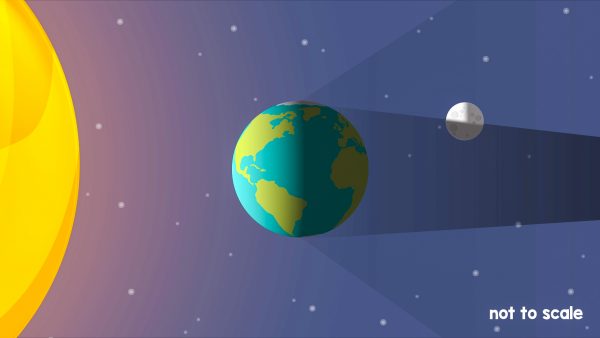Astronomy Definition
Astronomy studies celestial objects, space, and the universe. For example, astronomers use telescopes to discover new planets.
View Lesson on Solar & Lunar Eclipses
Become a member to get full access to our entire library of learning videos, reading material, quiz games, simple DIY activities & more.
Become a member to get full access to our entire library of learning videos, quiz games, & more.
Plans & Pricingto watch this full video.

Access All Videos
and Lessons, No Limits.
Access All Videos

No credit card required,
takes 7 sec to signup.
No card required

Ready-to-go lessons
that save you time.
Ready-to-go lessons
If you are on a school computer or network, ask your tech person to whitelist these URLs:
*.wistia.com, fast.wistia.com, fast.wistia.net, embedwistia-a.akamaihd.net
Sometimes a simple refresh solves this issue. If you need further help, contact us.
Solar & Lunar Eclipses
Fun Facts
- Historically, astronomy focused on observations of heavenly bodies as ancient civilizations studied the night sky.
- Planetary astronomers focus on growth, evolution, and death of planets.
- Solar astronomers spend their time analyzing a single star or sun.
Why Do We Need To Know About Astronomy
Studying astronomy helps us learn about the universe and the importance of exploring it to find new planets. Astronomers, who are scientists focusing on space, use what they know about when the moon or sun is blocked (eclipses) to find planets beyond our solar system. This shows how astronomy can help us learn more about space.
This area of science has found more than 2000 planets, some of which are similar to Earth and might be able to support life. The Kepler Space Telescope is one tool that has helped a lot in finding these planets, showing that studying space is key to understanding our universe and where we fit in.
Frequently Asked Questions
Check out the Full Lesson on Solar & Lunar Eclipses
In this lesson, we learn that:
- A model of the solar system can explain eclipses of the sun and the moon.
- A solar eclipse happens when our view of the sun is blocked by the moon.
- A lunar eclipse happens when the moon passes into Earth's shadow.
Related Topics
- Air Mass Definition
- Astronomy Definition
- Binary Code Definition
- Chloroplast Definition
- Circuit Definition
- Classify Definition
- Conservation Definition
- Continental Drift Definition
- Corona Definition
- Ecosphere Definition
- Environment Definition
- Frequency Definition
- Gas Definition
- Gas Definition
- Geosphere Definition
- Hearing Definition
- Humidity Definition
- Hydrosphere Definition
- Insulator Definition
- Invasive Species Definition
- Landform Definition
- Lunar Eclipse Definition
- Magnetism Definition
- Mold Fossils Definition
- Natural Selection Definition
- Newton’s 2nd Law Of Motion Definition
- Non-renewable Energy Definition
- Ocean Current Definition
- Offspring Definition
- Opposable Thumb Definition
- Partial Eclipse Definition
- Particle Model Of Matter Definition
- Plant Growth Definition
- Property Definition
- Reproduction Definition
- River Definition
- Simple Machines Definition
- Solar Eclipse Definition
- Solubility Definition
- Sound Wave Definition
- Species Definition
- Symbiosis Definition
- Temperature Definition
- Total Eclipse Definition
- Translucent Definition
- Vibrating Definition
- Water Distribution Definition
- Watershed Definition


Start a Free Trial Today. Get a $5 Amazon Gift Card!
Teachers! Start a free trial & we'll send your gift card within 1 day. Only cards left. Try it now.
Select Grade
Select Subject
This email is associated with a Science Kit subscription. Kit subscriptions are managed on this separate page: Manage Subscription

-
Download InvoiceScience & Math$/yr
-
Download InvoiceScience Only$/yr

access all lessons
• No credit card required •
"My students loved the videos. I started the video subscription in May and used them as a review before the state test, which I know contributed to 100% of my class passing the state test."
Rhonda Fox 4th Grade Teacher, Ocala, Florida
Use Generation Genius in Your School
Access all lessons free for 30 days.
"My students loved the videos. I started the video subscription in May and used them as a review before the state test, which I know contributed to 100% of my class passing the state test."
Rhonda Fox 4th Grade Teacher, Ocala, Florida
• No credit card required •
Already a member? Sign In
* no credit card required *

* no credit card required *
* no credit card required *

Get District Quote
Discounts start at 3 schools.
Sent!
Thank you for your inquiry.
We will email you a quote as soon as we can.

to Discover the Benefits of Generation Genius
Learn How to Save for Your School & District!
Please login or create an account to access additional resources

no credit card required
Skip, I will use a 3 day free trial
Enjoy your free 30 days trial
-
Unlimited access to our full library
of videos & lessons for grades K-5. -
You won’t be billed unless you keep your
account open past your 14-day free trial. -
You can cancel anytime in 1 click on the
manage account page or by emailing us.
-
Unlimited access to our full library of videos & lessons for grades K-5.
-
You won't be billed unless you keep your account open past 14 days.
-
You can cancel anytime in 1-click on the manage account page.
Cancel anytime in 1-click on the manage account page before the trial ends and you won't be charged.
Otherwise you will pay just $10 CAD/month for the service as long as your account is open.
Cancel anytime on the manage account page in 1-click and you won't be charged.
Otherwise you will pay $10 CAD/month for the service as long as your account is open.
We just sent you a confirmation email. Enjoy!
Done



























































































































 GENERATION GENIUS
GENERATION GENIUS